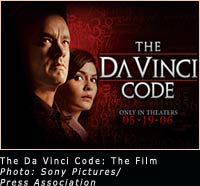 The long-awaited film adaptation of The Da Vinci Code, starring Tom Hanks as Brown’s cryptologist-hero Robert Langdon, opened on May 19 with a massive almost world-wide simultaneous release (nearly 16,000 cinemas). The film had been kept under wraps until its premiere to 1,000 critics and industry reps at the Cannes Film Festival the week before. The usual advance press screenings were not offered, the only glimpse of the film available pre-Cannes being the trailer (now online), and one of those half-hour the-making-of TV promo specials which are really the TV equivalent of the newspaper ‘advertorial’ - i.e. an extended advert disguised as editorial content. (These TV 'specials' have been popular with Hollywood since Disney pioneered the genre in 1954 with one for their upcoming 20,000 Leagues Under The Sea.)
The long-awaited film adaptation of The Da Vinci Code, starring Tom Hanks as Brown’s cryptologist-hero Robert Langdon, opened on May 19 with a massive almost world-wide simultaneous release (nearly 16,000 cinemas). The film had been kept under wraps until its premiere to 1,000 critics and industry reps at the Cannes Film Festival the week before. The usual advance press screenings were not offered, the only glimpse of the film available pre-Cannes being the trailer (now online), and one of those half-hour the-making-of TV promo specials which are really the TV equivalent of the newspaper ‘advertorial’ - i.e. an extended advert disguised as editorial content. (These TV 'specials' have been popular with Hollywood since Disney pioneered the genre in 1954 with one for their upcoming 20,000 Leagues Under The Sea.)This secrecy is a practice that always makes reviewers suspect a film is likely to get bad reviews, and these were not long in appearing (with the most snide comments reserved for Tom Hanks and his “ageing-academic” 1970s-style mullet hairdo). Apparently the secrecy was so great the usual studio precaution was not taken of public sneak previews (when last-minute tweaking is done, such as dubbing the unclear or risible lines of dialogue some critics complained of). The director is now suggesting people who are not getting much out of the film should go see the film again. That the studio had themselves suggested the film should be shown to open the Film Festival to an audience of critics who are notoriously hostile to Hollywood “blockbusters” suggests the makers were suffering from an uncritical overconfidence. (There were some pre-release predictions it would be the greatest film blockbuster of all time, just as the novel is the most successful ever.)
Overnight, the reviews, nearly all uncomplimentary, went online, with the trade paper Variety calling it a grim, stodgy affair, and only the NY Post giving it unqualified approval. (See also the Rotten Tomatoes site.) Bad reviews would not affect initial box office any more than poor reviews of the novel affected book sales, especially as so much is down to its curiosity value. (Opening-weekend ticket sales were estimated at $77 million in the US alone, and if it reaches its expected worldwide opening box office of $175m, it will certainly be “the biggest non-sequel opening of all time.")
But the studio may fear the film may not prove so popular in the long run if the word-of-mouth, which made the novel such a hit, is not so much “See the film even if you’ve read the book,” but “Stick to the book, it’s better.” As part of the studio strategy, the film was released right afterwards, but the first batch of ‘User Comments’ on the Internet Movie Database showed a similar lack of enthusiasm from first-nighters.





